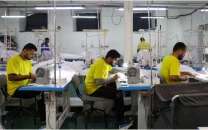Immunity decision delays Trump's sentencing in hush money case
Sentencing had been set for July 11, just days before Republican National Convention begins in Milwaukee on July 15
1719949751-0/Donald-Trump-(2)1719949751-0-640x480.webp)
A New York judge on Tuesday delayed Donald Trump's sentencing for his conviction on criminal charges stemming from hush money paid to a porn star until Sept. 18, after the former US president asked for a chance to argue he should have been immune from prosecution.
The sentencing had previously been set for July 11, just days before the Republican National Convention begins in Milwaukee on July 15.
The new timeline means Trump will likely have been nominated by his party to challenge Democratic President Joe Biden by the time he is sentenced. Justice Juan Merchan will now decide Trump's punishment, including whether to jail him, in the thick of the general election campaign ahead of the Nov. 5 election.
Trump faces an uphill battle getting the hush money conviction overturned, since much of the conduct at issue in the case predated his time in office.
Trump's lawyers on Monday asked Merchan to allow them to argue his conviction in New York state court in Manhattan should be overturned due to the US Supreme Court's ruling on July 1 that presidents are entitled to immunity from criminal prosecution for official acts.
Read also: US Supreme Court grants Trump some immunity, likely delaying trial
Prosecutors with Manhattan District Attorney Alvin Bragg's office said earlier on Tuesday that Trump's argument was "without merit," but agreed to delay the sentencing to give Trump the chance to make his case.
In a written ruling, Merchan said he would rule on Trump's request by Sept. 6, with sentencing to follow less than two weeks later should the judge decide to uphold the conviction. Trump's lawyers must submit their arguments by July 10, and prosecutors face a July 24 deadline to respond.
A Manhattan jury on May 30 found Trump guilty of falsifying business records to cover up his former lawyer Michael Cohen's $130,000 payment to adult film actress Stormy Daniels to stay quiet about an alleged 2006 sexual encounter until after the 2016 election, in which Trump defeated Democrat Hillary Clinton.
Prosecutors said the payment was part of an illicit scheme to influence the election.
Trump denies having had sex with Daniels and has vowed to appeal the conviction after his sentencing.
'A purely personal item'
In their letter to Merchan, defence lawyers argued that prosecutors had presented evidence involving Trump's official acts as president, including social media posts he made and conversations he had while in the White House.
Under the Supreme Court's ruling, prosecutors cannot use evidence related to official actions to help prove criminal cases involving unofficial actions.
"This official-acts evidence should never have been put before the jury," lawyers Todd Blanche and Emil Bove wrote.
Last year, Trump made a similar argument as part of an unsuccessful push to move the hush money case to federal court. In in July 2023, US District Judge Alvin Hellerstein wrote that the payment to Daniels "was a purely personal item."
"Hush money paid to an adult film star is not related to a president's official acts," Hellerstein wrote.
Trump's lawyers appealed Hellerstein's decision, but later abandoned the effort.



















COMMENTS
Comments are moderated and generally will be posted if they are on-topic and not abusive.
For more information, please see our Comments FAQ